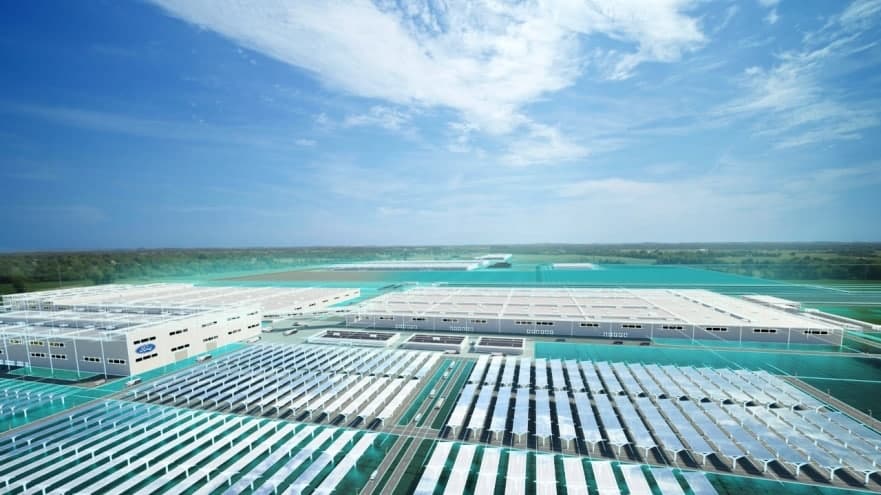
Rendering of the concept design of the all-new $5.6 billion Ford electric vehicle mega campus in Stanton, Tenn. Image courtesy of Ford Media Center.
In new podcast episode, SMART Local 4 business manager details enormous amount of sheet metal work coming to Tenn.
A new $5.6 billion Ford Motor Company electric vehicle plant in Stanton, Tenn. will be built entirely union, creating approximately 3,000 union positions during construction, including a possible peak of 800-900 sheet metal worker jobs.
“This thing is going to be huge,” said Local 4 Business Manager John Williams during a guest appearance on America’s Work Force Union Podcast in early July. “There’s going to be a job for just about anybody on this site.”
“This thing is going to be huge. There’s going to be a job for just about anybody on this site.”
– SMART Local 4 Business Manager John Williams
Williams’ conversation with host Ed Ferenc touched on a range of topics, from the history of SMART to applying for federal indoor air quality (IAQ) grants. The most notable topic by far, though, was the upcoming construction of the Ford EV plant.
“It’s going to be a game-changer for us,” he told Ferenc. “There’s no doubt it’s going to grow the union.”
Williams is a fourth-generation SMART member whose great grandfather joined the union in 1914, working as a sheet metal worker on the railroad in Norfolk, Va. Following in his footsteps – as well as those of his grandfather and father before him – Williams serves as both the business manager and financial secretary-treasurer of Local 4, which currently has approximately 350 members. That, Williams underscores, is why this plant – along with an upcoming battery plant in Kentucky – is such a big deal for area sheet metal workers.
Listen to the full July 5 podcast episode on the
America’s Work Force Union Podcast.
The project was by no means guaranteed to move forward. Tennessee’s anti-worker, so-called “right-to-work” laws make it difficult for unions to secure such mega projects, and the state governor owns one of the largest mechanical contractors in Tennessee (a nonunion company).
“There was some fight at the state capitol,” Williams said. “[Ford] had a little bit of pushback, because our state isn’t too union friendly.” But Ford refused to compromise – and, as a result, Local 4 has the chance to employ its membership and embark on an enormous recruiting campaign. To meet the numbers needed for the project, the local hopes to dramatically increase its membership. Helping with that goal, Williams said, is the fact that Ford aims to have approximately 30% of the job site’s workforce be in training.
“We’ve been going into the schools, we’ve been hitting some of the jobsites and telling people, ‘Hey, you can get some free training here,’ ” he said, referring to SMART’s earn-while-you-learn apprenticeship program and state-of-the-art training center. With the enormous amount of work coming in, he added, “It’s just a good time to get into the construction trade.”
In addition to the Ford plant, which Williams expects to begin construction later in the year, Fenerc and Williams discussed Local 4’s efforts to take advantage of federal funds for state and local COVID-19 fiscal recovery – which would secure even more work for the membership. As part of the economic bounce-back from COVID-19, the Biden Administration has allocated funds for state and local governments, as well as other organizations, to apply for grants related to improving indoor air quality. That means local governments, schools, commercial buildings, residential complexes and more can apply for funding to upgrade ductwork and improve ventilation. This is especially important in places like nursing homes and schools, Williams said, estimating that approximately 75% of schools need retrofitting to ensure kids are breathing clean air.
“This is a big deal, because indoor air quality effects everybody. We want to make sure our children are safe. The same goes for wherever people congregate.”
– SMART Local 4 Business Manager John Williams
“This is a big deal, because indoor air quality effects everybody,” he added. “We want to make sure our children are safe. The same goes for wherever people congregate.”
Unfortunately, while the funding criteria makes clear that organizations should partner with highly skilled, expertly trained workers for IAQ improvements – i.e., SMART members – there are no prevailing wage requirements. Still, Williams said, Local 4 intends to partner with area organizations to help them apply for the grants and win the funding needed to make IAQ improvements. And while they can’t require those organizations to use union labor, they can make it abundantly clear that SMART members are the highest-qualified workers for the job.
“We definitely want our contractors in there doing the work, and we want [local organizations] to know we’re here to help them get that grant money,” he explained. “[Even without prevailing wages,] we’re still going to look out for the worker. We want to make sure that people are getting paid right, we want to make sure people get good benefits, that they get a living wage for their family.”
Related News
- New Jersey Train Length, Crew Size Law Awaits Governor’s Signature
- CSX Conductor, Single Mother Devastated in Head-on Collision
- Union Mourns the Loss of Brother Charles Harrison
- FRA Issues Grade-Crossing Safety Advisory
- Amtrak To Give SMART-TD Members Holiday Bonuses
- Value of Unions
- 2026 Railroad Retirement and Unemployment Insurance Tax Changes
- SMART-TD Members on UP Properties Ratify Five-Year Agreement
- Railroader’s Son to Perform at Carnegie Hall
- Rail Trespassing and Suicide Fatalities Up 70%